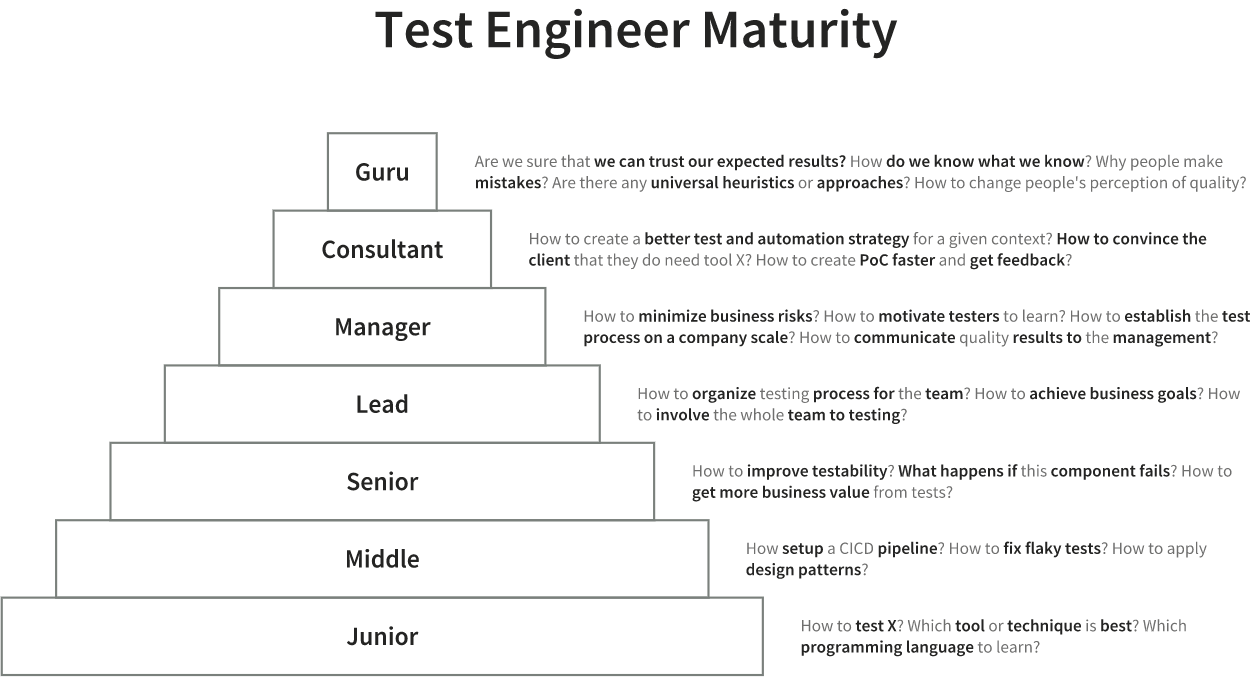Photo by Lance Grandahl on Unsplash
Questions
From time to time, similar questions arise in various tester chats and forums:
- Do I know enough as a junior or trainee?
- What should the middle engineer know?
- When to understand that you are a senior?
- How to get the position of lead or manager?
I have also asked myself and other people such questions. But unfortunately, he did not receive comprehensive answers.
After all, there is no single correct answer to such questions. Everything depends on the context: you, the company, and the market.
Test Engineer Maturity
Instead of looking for complex answers, I suggest paying attention to what questions we ask ourselves at each stage of our career development. Each company has its own stages of career development, but I see the following: Junior => Middle => Senior => Lead => Manager => Consultant => “Guru”.

Junior
- How to test this feature or application?
- Which test design technique is best?
- What is Git, and why is it needed?
- Which programming language to choose for automation (to get bigger salary)?
- What is the best testing tool?
Middle
- How to properly configure CICD pipeline?
- How to fix all flaky tests?
- What are design patterns, and how to apply them?
- Why do we need to write clean code and follow coding conventions?
- How to run tests in multiple threads somewhere on Selenoid?
Senior
- How to improve the testability of a particular feature or service?
- What are the problems with the system architecture? What will happen if “this individual component” on the diagram stops working correctly?
- How much business value do self-tests bring?
- How to encourage the entire team, from developers to managers, to use test results?
- Which tests are better to do ‘manually’ rather than to spend time on automation?
- How quickly and safely does this or that component work? But how does one component’s bad performance affect the system’s performance as a whole?
Lead
- How to properly organize testing processes in a team?
- How to ensure that the team achieves business goals?
- How to create a culture of shared responsibility for quality in the team?
- How to collect metrics, work with priorities, and communicate with different teams?
Manager
- How does testing help minimize business risks?
- How to motivate test engineers to grow and develop?
- How to create testing vision for the company?
- How to set up processes and engineering culture at the company level?
- How to communicate test results to senior management (in their language)?
Consultant
- How to create a better testing strategy for a specific company in a particular context?
- How to convince the client that this tool or approach is better?
- How to quickly make a Proof-of-Concept of an automation solution and get feedback?
- How do you train engineers or managers on a chosen concept, approach, or tool?
“Guru”
- Why do we test?
- How does testing differ from verification?
- How can we tell if our expected results are correct?
- How do we know what we know?
- How do we learn?
- Are there universal approaches and heuristics for testing?
- How to measure or change people’s perception of quality?
Conclusions
Of course, if you are at the same stage, no one forbids you to ask any other questions from different levels.
But the effectiveness of your work and the answers to questions will directly depend on your skill level and the scope of work.
